中西文化差异英文
- 格式:doc
- 大小:26.50 KB
- 文档页数:2
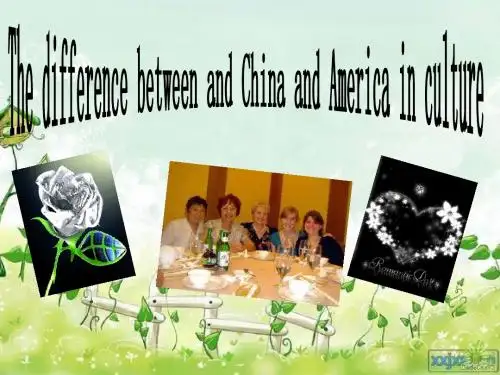
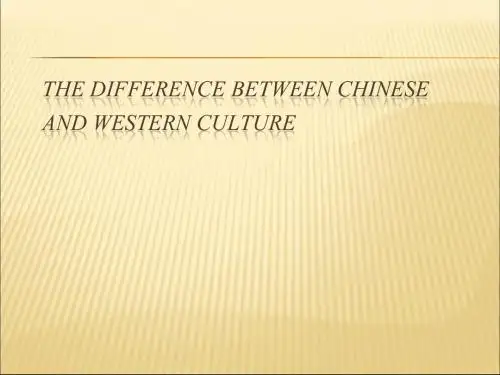
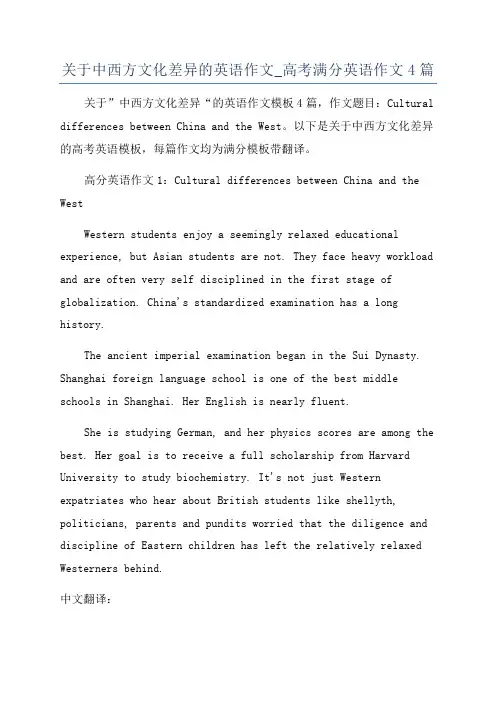
关于中西方文化差异的英语作文_高考满分英语作文4篇关于”中西方文化差异“的英语作文模板4篇,作文题目:Cultural differences between China and the West。
以下是关于中西方文化差异的高考英语模板,每篇作文均为满分模板带翻译。
高分英语作文1:Cultural differences between China and the WestWestern students enjoy a seemingly relaxed educational experience, but Asian students are not. They face heavy workload and are often very self disciplined in the first stage of globalization. China's standardized examination has a long history.The ancient imperial examination began in the Sui Dynasty. Shanghai foreign language school is one of the best middle schools in Shanghai. Her English is nearly fluent.She is studying German, and her physics scores are among the best. Her goal is to receive a full scholarship from Harvard University to study biochemistry. It's not just Western expatriates who hear about British students like shellyth, politicians, parents and pundits worried that the diligence and discipline of Eastern children has left the relatively relaxed Westerners behind.中文翻译:西方学生享受着看似轻松的教育体验,但亚洲的学生却并非如此,他们面临着繁重的工作量,而且在全球化的第一阶段往往非常自律。
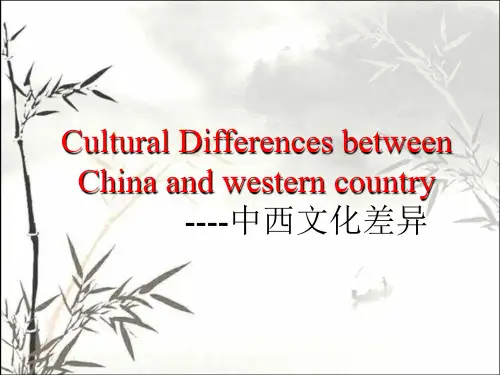
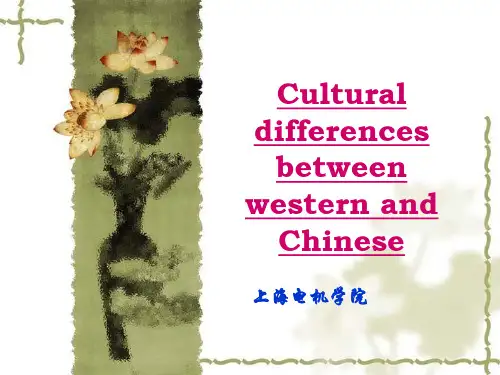
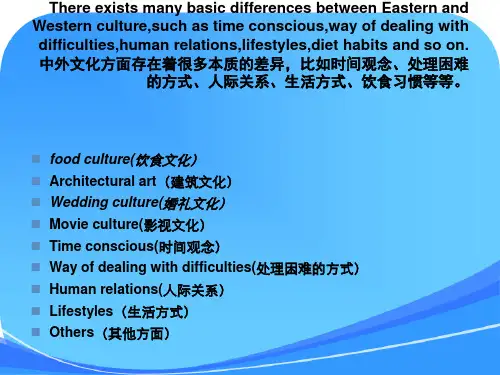
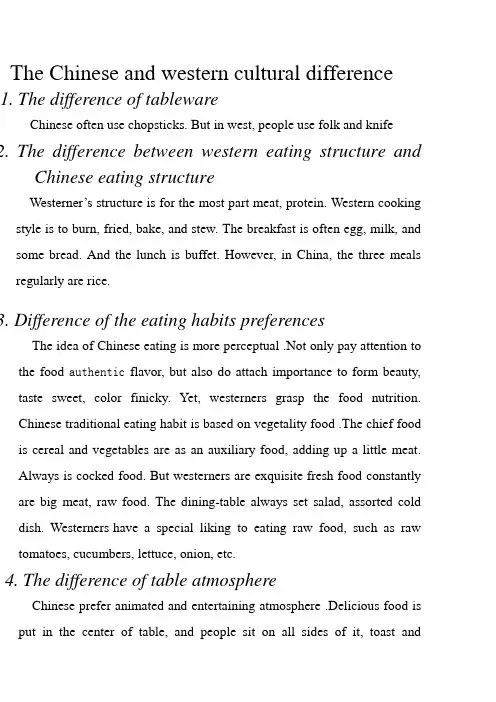
The Chinese and western cultural difference 1. The difference of tablewareChinese often use chopsticks. But in west, people use folk and knife 2. The difference between western eating structure andChinese eating structureWesterner’s structure is for the most part meat, protein. Western cooking style is to burn, fried, bake, and stew. The breakfast is often egg, milk, and some bread. And the lunch is buffet. However, in China, the three meals regularly are rice.3. Difference of the eating habits preferencesThe idea of Chinese eating is more perceptual .Not only pay attention to the food authentic flavor, but also do attach importance to form beauty, taste sweet, color finicky. Yet, westerners grasp the food nutrition.Chinese traditional eating habit is based on vegetality food .The chief food is cereal and vegetables are as an auxiliary food, adding up a little meat.Always is cocked food. But westerners are exquisite fresh food constantly are big meat, raw food. The dining-table always set salad, assorted cold dish. Westerners have a special liking to eating raw food, such as raw tomatoes, cucumbers, lettuce, onion, etc.4. The difference of table atmosphereChinese prefer animated and entertaining atmosphere .Delicious food is put in the center of table, and people sit on all sides of it, toast andencourage guests to drink wines, to express a feeling of respect and pleasure, courtesy. Westerners pursue own freedom .You should be quiet; at least you can not speak loudly. Westerners think that it is impolite to speak when you are stuffed.5. The difference of table equitiesIn western countries, all activities are going by arranged beforehand time .The formal party requires to arrive in time. If you are late for 10 minutes, it will be regarded to be bad manners. It is not respectful to the host .But in china, people tend to be late or arrive early. And also in west, the guests should dress up and frequently it is necessary to dress formal attire. In China, it is enough to dress cleanly.In west, we should seat uprightly, do not put elbows in the table, and try to use folk and knife, not to use hand to hold. When you drink soup, do not sip. Just chew no sound. When you eat fish or meat, do not vomit directly, you can use napkins, and throw it in the folk next put into plate.6. Traditional ideasChinese are deeply influenced by Buddhism and advocate not killing animals.Therefore, chineses are predisposed to vegetables but not meat sand fishes. Westerners succeed national tradition and go hunting out to sea. So Chinese vegetarians have difficulties in adapting themselves to westerneating habit that three meals are pork and steak.There are some tips I research about using tableware 1.American eating habit is funny. They eat almost everything with a fork, and it appears that holding a knife in the right hand longer than a few seconds is considered to be against table manners.2. The system is that if it is absolutely necessary to use a knife, people take a fork in their left hand, and cut off pierce of meat or whatever it is in the normal manner. They put the knife down, transfer the fork to their right hands, and only then do transport the food to their mouth. This is ludicrous, but it is considered good manner.3. In west, it is absolutely necessary to use a knife, Americans do not use one, because obviously this get thing complicated. And you will therefore see them try to cut food like potatoes, fish, and even bacon with a fork.4. Tables are generally laid with one knife and two forks, the outside fork is for the salad .If you do use your knife, remember to save it for the meat.5. Even desserts are eaten with a fork if at all possible, and the spoon to be for coffee (but you use it for your dessert, no one will say anything) But in china, people always use chopsticks, also add some spoons.MichelleClass two。
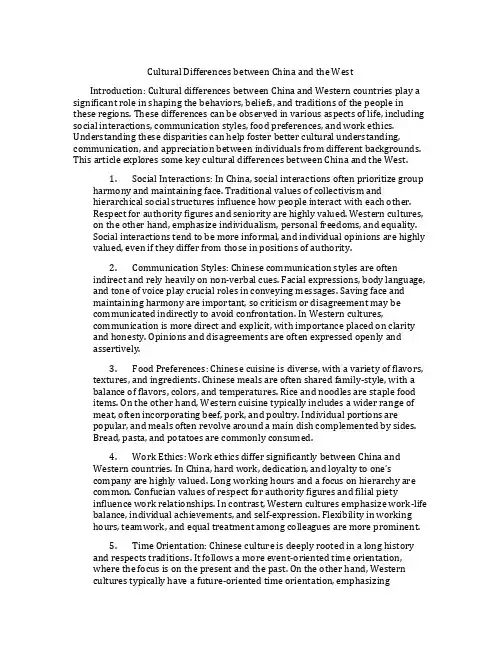
Cultural Differences between China and the WestIntroduction: Cultural differences between China and Western countries play a significant role in shaping the behaviors, beliefs, and traditions of the people in these regions. These differences can be observed in various aspects of life, including social interactions, communication styles, food preferences, and work ethics. Understanding these disparities can help foster better cultural understanding, communication, and appreciation between individuals from different backgrounds. This article explores some key cultural differences between China and the West.1.Social Interactions: In China, social interactions often prioritize groupharmony and maintaining face. Traditional values of collectivism andhierarchical social structures influence how people interact with each other.Respect for authority figures and seniority are highly valued. Western cultures, on the other hand, emphasize individualism, personal freedoms, and equality.Social interactions tend to be more informal, and individual opinions are highly valued, even if they differ from those in positions of authority.munication Styles: Chinese communication styles are oftenindirect and rely heavily on non-verbal cues. Facial expressions, body language, and tone of voice play crucial roles in conveying messages. Saving face andmaintaining harmony are important, so criticism or disagreement may becommunicated indirectly to avoid confrontation. In Western cultures,communication is more direct and explicit, with importance placed on clarity and honesty. Opinions and disagreements are often expressed openly andassertively.3.Food Preferences: Chinese cuisine is diverse, with a variety of flavors,textures, and ingredients. Chinese meals are often shared family-style, with a balance of flavors, colors, and temperatures. Rice and noodles are staple food items. On the other hand, Western cuisine typically includes a wider range of meat, often incorporating beef, pork, and poultry. Individual portions arepopular, and meals often revolve around a main dish complemented by sides.Bread, pasta, and potatoes are commonly consumed.4.Work Ethics: Work ethics differ significantly between China andWestern countries. In China, hard work, dedication, and loyalty to one’scompany are highly valued. Long working hours and a focus on hierarchy are common. Confucian values of respect for authority figures and filial pietyinfluence work relationships. In contrast, Western cultures emphasize work-life balance, individual achievements, and self-expression. Flexibility in working hours, teamwork, and equal treatment among colleagues are more prominent.5.Time Orientation: Chinese culture is deeply rooted in a long historyand respects traditions. It follows a more event-oriented time orientation,where the focus is on the present and the past. On the other hand, Westerncultures typically have a future-oriented time orientation, emphasizingplanning, progress, and achieving goals. Time is seen as a valuable resource to be managed efficiently.Conclusion: Cultural differences between China and the West manifest in various aspects of life, including social interactions, communication styles, food preferences, work ethics, and time orientation. Recognizing and appreciating these disparities can help individuals from different backgrounds develop better cross-cultural understanding and collaboration. By fostering cultural sensitivity and embracing diversity, we can build bridges between cultures and promote harmony in an increasingly interconnected world.。
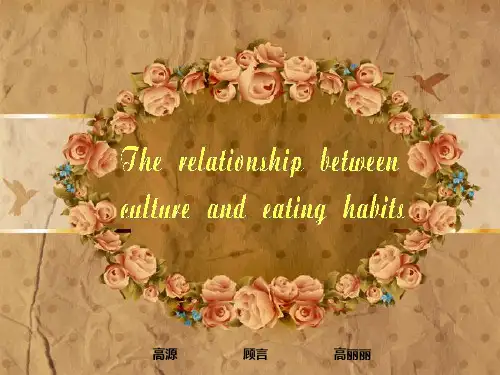
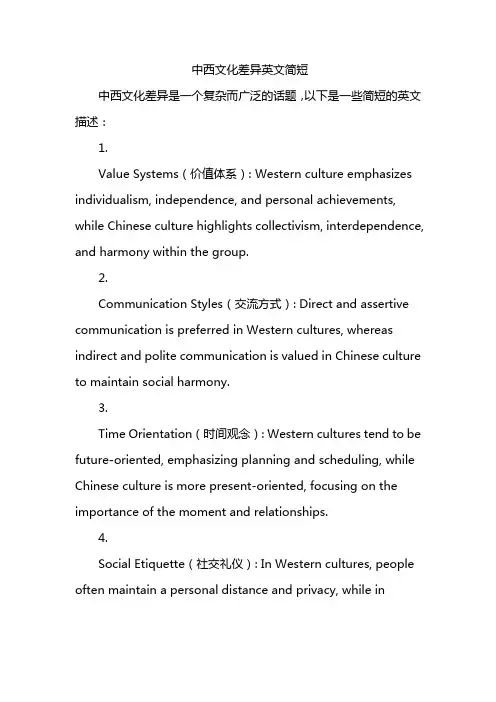
中西文化差异英文简短中西文化差异是一个复杂而广泛的话题,以下是一些简短的英文描述:1.Value Systems(价值体系): Western culture emphasizes individualism, independence, and personal achievements, while Chinese culture highlights collectivism, interdependence, and harmony within the group.2.Communication Styles(交流方式): Direct and assertive communication is preferred in Western cultures, whereas indirect and polite communication is valued in Chinese culture to maintain social harmony.3.Time Orientation(时间观念): Western cultures tend to be future-oriented, emphasizing planning and scheduling, while Chinese culture is more present-oriented, focusing on the importance of the moment and relationships.4.Social Etiquette(社交礼仪): In Western cultures, people often maintain a personal distance and privacy, while inChinese culture, there is a greater emphasis on social connections, networking, and saving face.5.Perception of Authority(权威观念): Western cultures generally have a more democratic approach and value challenging authority, whereas Chinese culture places a high degree of respect for elders, hierarchy, and tradition.请注意,这些只是一些一般性观察,并不能涵盖所有个体情况。

The comparison between Chinese and Western festivals中西方节日文化的差异比较Abstract: the process of comparing the Chinese and Western festivals and studying Western histories and cultures can help people promote the communication and understanding of different cultures。
With the further development of society and inter—cultures,globalization will affect many aspects of life in all countries。
And western festivals are becoming more and more popular in China。
We should respect them and select the essence。
China boasts a brilliant history and splendid traditions. In modern times,Chinese tradition should be preserved and promoted. But it seems that young people no longer treasure the tradition. On the contrary,they turn to pursue enthusiastically a seemingly more modern culture. If this trend is allowed to continue, the priceless heritage of our ancestors will be replaced by western traditions. Nobody expects such a consequence. So let’s join hand in hand to protect and carry forward Chinese tradition.Key words:Traditional festivals;Chinese and Western cultures; difference; globalizationIntroduction:“A holiday of a nation represents a glorious culture and concentrated customs of a nation。
中西方文化差异英语作文英文回答:Cultural differences between the East and the West have captivated the attention of scholars and laypeople alikefor centuries. These disparities manifest in various aspects of life, including communication styles, social norms, and value systems.Communication。
In Western cultures, direct and explicit communication is highly valued. Individuals are encouraged to express their opinions and ideas openly, even if they may be controversial. In contrast, East Asian cultures emphasize indirect and implicit communication. People often convey their thoughts and feelings through subtle hints, gestures, and context. This difference in communication style can lead to misunderstandings and misinterpretations when people from different cultural backgrounds interact.Social Norms。
Social norms play a crucial role in shaping behavior in both East and West. In Western cultures, individualism is prevalent. People are encouraged to pursue their own goals and desires, even if they conflict with the norms of their society. In contrast, East Asian cultures place a greater emphasis on collectivism. Individuals are expected to prioritize the needs of their group or family over their own. This difference in social norms can lead to different behaviors and expectations in various social situations.Value Systems。
Differences between Chinese and Western cultureAs we know the differences between the our estern cultures and western cultures are quite obvious.I would like to state some of my opinions in this paper.I.difference in the thinking stylePeople on the earth are homologous,but different people in different place have different performance on the way of thinking. Differences between Chinese and Western way of thinking reflected in many aspects.Such as the difference between abstract and concrete, reflected in their attitudes towards life can be understood as Westernersare more practical, and the Chinese are much more biased towards some spiritual experience. Westerners pay attention to logical thinking, but Chinese pay more attention to dialectical thinking and so on. As Chinese and western way of thinking are different, there are differences in expression of the order. For example,we can see that the names of western style are not like ours,they put their given names at the first place,while we put them after our family names,that is to say,we regard our family more important than ourselves,and it's the traditional way of estern thinking.Westerners have another way of thinking,they think that each person is important in our world and society,and a person should play a important role among our human beings.II.differences in daily communicationWesterners are frank,but chinese are humility.The reflection between westerners and chinese on the treatment of praise is different.In the West, people can accept it generously. As the Chinese have long term impact of Confucian education, we treat others’ praise and recognition not often take the attitude of ourselves, or there is suspected of arrogant. When meeting acquaintances, chinese and westerners greet each other are also different. Chinese people often say "Have you eat ?" "Where are you going?"except the general asked”hello”. In western culture, this is not a greeting, but substantive issues. When British and American people meet,they usually use a polite phrase like "How are you?" or "Nice to meet you!" In addtion,when westerners accept gift from others,they are willing to open it and praise it directly,but chinese do not do like that.III.differences in customsChinese people regard ourselves as descendants of the Dragon.Chinese have a supreme respect for the dragon, we think dragon is a symbol of our nation. In the dynasty time,Chinese emperors generally self-styled "dragon".However,in the West, the dragon was regarded as the devil, and it was killed by the legendary god of protection, so they set a day as a festival to celebrate the lifting of a disaster, and thank the protection of God.For this reason, when the students describe a person's lively, they say "He / She is full of vim and vigor." not"He / She is as lively as a dragon and tiger". Everyone has their favorite color, so does a country and a nation. Chinese like the red colour ,because chinese think red is a symbol of luck and enthusiam. But westerners perfer to the blue colour,they think blue can make themselves calm. Thus,the preferences of different colors can reflect the whole of a country’s aesthetic taste.IV. differences in eating cultrueChinese and Western diets are very different, so the differences also have an impact on the national character. In China, a banquet, no matter what purpose, there will be only one form, that is, everyone sit around one table. People toast each other,and eat the same food in one plate,,It reflects the mutual respect between people even the traditional courteous virtue. Although from the health point of view, this dietary approach has obvious shortcomings, it is consistent with our"great national reunion".In western countries,the most obvious contrast of the Chinese eating style is buffet.That is,display all the dishes,people take what they need, not fixed to one seat for eating,and walk freely.In this way,it can facilitate the emotional exchanges between individuals, showing the Westerners personality and self-respect, however, eating their own food, do not disturb others,it is lack of the mood of Chinese people's party.V. differences in religious beliefNo matter Chinese or Westerners,people believe in different religion.In China, different people believe in different immortals,most people believe in Buddhism,but they also believe in other immortals at the same time. In many Western countries, especially in the Anglo-American, people only believe in Christian, and everyone believe in it including the leaders of the country,but the ruiling party’s members must be atheist in China. In addition, w estern countries’ people tend to think that singular number are lucky ,and they would like to plus one to the whole hundred and thousand,such as one hundred and one thanks, or have one thousand one things to do,etc. On the contrary, the traditional Chinese culture believes that the number of pairs is the lucky number. People use many number of pairs to express the good things ,good luck and so on..。